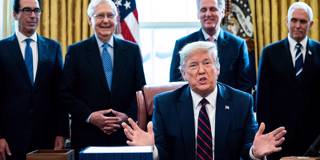By introducing a uniquely disruptive shock to both supply and demand, the COVID-19 pandemic has upended longstanding ideological debates almost overnight. Suddenly, far-reaching state intervention in the economy has become necessary to save market capitalism, which is unlikely to emerge unchanged.
NEW YORK – Ironically, just as the “democratic socialist” Bernie Sanders has suspended his presidential campaign in the United States, many of his policy proposals are becoming necessary around the world. Social-distancing measures to mitigate the COVID-19 pandemic have disrupted production and household income streams alike. But the effectiveness of social distancing could be undermined by workers who lack proper health insurance, adequate sick pay, unemployment compensation, or other forms of income support or savings. These individuals will feel that they have no choice but to keep working, despite the health risks. Universal health insurance looks like the inevitable outcome, even in the US, where Sanders, virtually alone among national politicians, has advocated it for decades.
At the same time, the original supply and demand shocks – to labor and household consumption, respectively – from the COVID-19 crisis are being reinforced by the breakdown of global, national, regional, and local supply chains. And all of these real-economy shocks are causing disruptions in the financial system, too.
Under these conditions, central banks have a critical role to play in preventing disorderly financial markets from adding to the strain felt by non-financial companies and households. At a minimum, central banks must step in to ensure ample liquidity in key markets, including those for government debt, commercial paper, and key asset-backed securities such as residential and commercial mortgages.

NEW YORK – Ironically, just as the “democratic socialist” Bernie Sanders has suspended his presidential campaign in the United States, many of his policy proposals are becoming necessary around the world. Social-distancing measures to mitigate the COVID-19 pandemic have disrupted production and household income streams alike. But the effectiveness of social distancing could be undermined by workers who lack proper health insurance, adequate sick pay, unemployment compensation, or other forms of income support or savings. These individuals will feel that they have no choice but to keep working, despite the health risks. Universal health insurance looks like the inevitable outcome, even in the US, where Sanders, virtually alone among national politicians, has advocated it for decades.
At the same time, the original supply and demand shocks – to labor and household consumption, respectively – from the COVID-19 crisis are being reinforced by the breakdown of global, national, regional, and local supply chains. And all of these real-economy shocks are causing disruptions in the financial system, too.
Under these conditions, central banks have a critical role to play in preventing disorderly financial markets from adding to the strain felt by non-financial companies and households. At a minimum, central banks must step in to ensure ample liquidity in key markets, including those for government debt, commercial paper, and key asset-backed securities such as residential and commercial mortgages.